Prescription costs are rising, mainly due to brand-name drugs recouping their investment during the period of patent protection and market exclusivity. For this reason, many payers and prescribers encourage use of the cheaper generic versions [1]. This has been found to have another positive consequence, namely the increased accessibility to prescription treatments and an increased compliance with drug regimens, particularly in the case of chronic conditions [2, 3].
Cost-savings and patient choice are important factors when considering substituting a brand-name drug for a generic. However, the most important concern that must be taken into account when considering generic substitution is the therapeutic equivalence of the generic and brand-name prescription [4].
Research
From a review of the scientific literature we find that eleven studies have directly compared clinical outcomes among patients taking either a brand-name or a generic diuretic for cardiovascular disease management [5]. Ten of these studies compared the loop diuretic furosemide (Lasix) and one with the combination diuretic triamterene-hydrochlorothiazide (Dyazide). The clinical endpoints investigated in these studies (seven of which were only bioequivalence studies with a small number of young, healthy subjects) were urine output and urine electrolytes. Only one of these seven studies, reported in 1985, found any significant differences between the generic and brand-name drug's ability to influence urine output in the 12 subjects in a six-hour period [6].
Three of the furosemide studies investigated volume overload with the subjects and each showed a therapeutic equivalence with this clinical outcome. One randomised controlled cross-over designed trial with 17 patients with congestive heart failure in the US reported a large intraindividual variability in the subjects' urine electrolytes, which may have masked any superiority of Lasix with IV, and three other generic formulations of furosemide.
The one randomised, controlled study that compared the therapeutic equivalence of Dyazide with triamterene-hydrochlorothiazide in 30 subjects found no significant differences in electrolytes, complete blood count, blood pressure, or tolerability when the subjects took either the generic or brand-name drug for three weeks at a time [7].
Conclusion
Empirical evidence thus suggests that the generic formulations of diuretics do not have any significant differences, in terms of clinical outcome, except the one furosemide study of Meyer et al. with 12 patients. However, the majority of studies discussed above were small-scale bioequivalency studies powered to assess differences in the pharmacokinetic parameters rather than clinical outcomes; only large variations in the clinical outcome would be statistically significant. Another limitation of these results is that the hypothesis under test in the clinical outcomes was a superiority hypothesis, rather than a non-inferiority hypothesis. Conclusions from a superiority study showing no significant difference cannot lead to the idea that the generic or brand-name formulation is comparable, only that there is insufficient data to conclude that the therapeutic agents are different.
At present, these studies above are all we have to base our decisions on whether to use a brand-name diuretic or its cheaper formulation. Further studies, sufficiently designed and powered to note interindividual differences in clinical outcome are needed.
Related articles
The therapeutic equivalence of brand-name and generic narrow therapeutic index (NTI) cardiovascular drugs
The therapeutic equivalence of antiplatelet agents, ACE-inhibitors, statins and alpha-blockers
The clinical equivalence of generic and brand-name calcium channel blockers
The clinical equivalence of brand-name beta-blockers and their generic counterparts
Generic or brand-name drugs for cardiovascular disease? Does the evidence match current opinion?
The rise in power of generic drugs
References
1. Fischer MA, Avorn J. Economic implications of evidence-based prescribing for hypertension: can better care cost less? JAMA. 2004;291(15):1850-6.
2. Shrank WH, Hoang T, Ettner SL, Glassman PA, Nair K, DeLapp D, et al. The implications of choice: prescribing generic or preferred pharmaceuticals improves medication adherence for chronic conditions. Arch Intern Med. 2006;166(3):332-7.
3. Steinbroook R. Closing the affordability gap for drugs in low-income countries. N Engl J Med. 2007;357(20):1996-9.
4. Johnston A. Challenges of therapeutic substitution of drugs for economic reasons: focus on CVD prevention. Curr Med Res Opin. 2010;26(4):871-8.
5. Kesselheim AS, Misono AS, Lee JL, Stedman MR, Brookhart MA, Choudry NK, et al. Clinical equivalence of generic and brand-name drugs used in cardiovascular disease: a systematic review and meta-analysis. JAMA. 2008;300(21):2514-26.
6. Meyer BH, Müller FO, Swart KJ, Luus HG, Werkman IM. Comparative bio-availability of four formulations of furosemide. S Afr Med J. 1985;68(9):645-7.
7. Sharoky M, Perkal M, Tabatznik B, Cane RC Jr, Costello K, Goodwin P. Comparative efficacy and bioequivalence of a brand-name and a generic triamterene-hydrochlorothiazide combination product. Clin Pharm. 1989;8(7):496-500.








 0
0










Post your comment